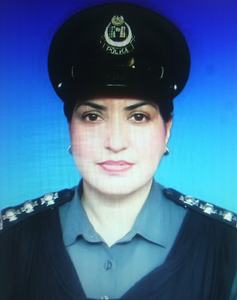PESHAWAR: District Superintendent Police Aneela Naz has worked hard to earn a name in a male-dominated police force.
As she makes her way into her office, a man stands up in a gesture of respect: she is one of the few women serving the police department for almost two decades. Inside, she settles down in her chair, glancing at a stack of forms waiting to be signed. The room is as sparsely decorated as other police offices in Khyber Pakhthunkhwa; aside from a desk and a plaque with her name, there isn’t much else.
“I don’t know how 19 years have passed,” DSP Naz laughs. Over the years, she has learnt it all: from learning how to operate every type of weapon to going on raids and operations alongside her male colleagues. She has topped every course and now trains both men and women in the formidable police force.
Naz has seen the KP police force transform from a team with only 19 women, to one with over 600 serving in different departments all across the province.
Also read: Cultural taboos still a hurdle for women in KP to join police
A woman doing a ‘man’s’ job

Fresh out of school and looking for a job in 1996, Naz was discouraged from joining the police force. “Even thinking of joining the police [for women] was considered bad in society,” she remembers.
Despite hailing from a conservative village tucked away in the district of Lakki Marwat, Naz’s father was a learned man whose refused to conform. He moved to Peshawar so his children—two daughters and three sons—could get a good education and make something of their lives. Today, all five siblings are government employees in different departments.
Naz finally joined the police force as an assistant sub-inspector in 1996. Soon after her bold decision, Naz’s close family members cut off relations with her family as they “felt embarrassed” by her career choice. One uncle specifically told her: don’t show up anywhere in your police uniform.
Her decision to take on the job was not well received by her neighbours and extended family either. They increasingly felt the profession was associated with corruption and bribery, and were alarmed at her decision as there very hardly any women in the police force.
Sit together, raid together
“The concept of men and women having different abilities has ended now; we are no longer considered different,” say Naz.
At the time she joined, men and women had separate trainings and hardly worked together. She particularly noticed a gender bias when it came to promotions; but says that isn’t the case anymore. It helps to have a police force with over 600 women, including dozens of officers and a handful of DSPs.
Neither is there compulsion upon women to behave or act in a certain way. There is no dress code prescribing a traditional shalwar kameez, or the more western pants and shirt. “There are two uniforms,” Naz explains. Both options are available to female officers to choose from.
Getting to a stage where men and women train and work together was difficult, but now life is easier. Naz says today women have no problem working alongside men, and in her case, even training them.

In her training sessions across the province— including in Mardan, Swabi, Charsadda and Nowshera— Naz interacts with both men and women. “Men and women sit together, and they raid together,” she smiles.
A force of women for women
At specialised training schools all over KP, female officers undergo intensive physical training, and learn how to shoot and handle weapons and artillery.
“Our ladies have learnt to be tougher after doing these courses,” Naz says. “They can face challenges themselves.”
But she feels women should consider the profession for more than just the learning skills it has to offer. “It’s a meaningful way to help people,” she says. “People know we can help solve women’s problems.”

Naz describes the various stations where citizens, especially women, have started coming in regularly because of the presence of female officers. Naz feels they offer a welcoming environment for women, who generally do not feel comfortable confiding in male officers.
In comparison, the moment they enter a station and see another woman sitting behind a desk waiting to talk to them, they open up. “Women can share their troubles with other women,” Naz says. “They can say what they really feel.”
Rectifying misconceptions
Today, the same uncle who felt embarrassed by Naz’s profession now introduces her with pride to his friends and relatives. “It isn’t a negative concept for them anymore,” she beams. “I know they feel proud of me when they introduce me to others.
Naz represented the Pakistani police during a conference in the UK, where she also received an award for serving her country. Now that her relatives see what she has achieved, she says they treat her with greater respect and dignity. They no longer harbour misconceptions about women in the police force.
“It is now considered a respectable institution,” Naz says. She feels more and more women are attracted to the police force because of the department’s comfortable environment.

















































